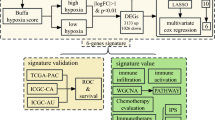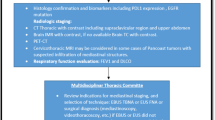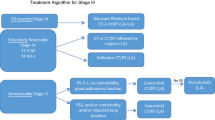Summary
Hypoxia-inducible factor-1 alpha (HIF-1α) plays a vital role in the initiation, evaluation and prognosis in lung cancer. The prognostic value of HIF-1α reported in diverse study remains disputable. Accordingly, a meta-analysis was implemented to further understand the prognostic role of HIF-1α in lung cancer. The relationship between HIF-1α and the clinicopathological characteristics and prognosis of lung cancer were investigated by a meta-analysis. PubMed and Embase were searched from their inception to January 2015 for observational studies. Fixed-effects or random-effects meta-analyses were used to calculate odds ratios and 95% confidence intervals of different comparisons. A total of 20 studies met the criteria. The results showed that HIF-1α expression in lung cancer tissues was significantly higher than that in normal lung tissues. Expression of HIF-1α in patients with squamous cell carcinoma was significantly higher than that of patients with adenocarcinomas. Similarly, non-small cell lung cancer (NSCLC) patients had higher HIF-1α expression than small cell lung cancer (SCLC) patients. Moreover, lymph node metastasized tissues had higher HIF-1α expression than non-lymph node metastasized tissues. A high level HIF-1α expression was well correlated with the expression of vascular endothelial growth factor and epidermal growth factor receptor in the NSCLC. Notably, NSCLC or SCLC patients with positive HIF-1α expression in tumor tissues had lower overall survival rate than patients with negative HIF-1α expression. It was suggested that HIF-1α expression may be a prognostic biomarker and a potential therapeutic target for lung cancer.
Similar content being viewed by others
References
Siegel R, Naishadham D, Jemal A. Cancer statistics, 2013. CA Cancer J Clin, 2013, 63(1): 11–30
Siegel R, DeSantis C, Virgo K, et al. Cancer treatment and survivorship statistics, 2012. CA Cancer J Clin, 2012, 62(4): 220–241
Zhong H, Semenza GL, Simons JW, et al. Up-regulation of hypoxia-inducible factor 1alpha is an early event in prostate carcinogenesis. Cancer Detect Prev, 2004, 28(2): 88–93
Volm M, Koomagi R. Hypoxia-inducible factor (HIF-1) and its relationship to apoptosis and proliferation in lung cancer. Anticancer Res, 2000, 20(3): 1527–1533
Giatromanolaki A, Oukourakis M, Sivridis E, et al. Relation of hypoxia inducible factor 1 alpha and 2 alpha in operable non-small cell lung cancer to angiogenic/molecular profile of tumours and survival. Br J Cancer, 2001, 85(6): 881–890
Lee CH, Lee MK, Kang CD, et al. Differential expression of hypoxia inducible factor-1 alpha and tumor cell proliferation between squamous cell carcinomas and adenocarcinomas among operable non-small cell lung carcinomas. J Korean Med Sci, 2003, 18(2): 196–203
Hirami Y, Aoe M, Tsukuda K, et al. Relation of epidermal growth factor receptor, phosphorylated-Akt, and hypoxia-inducible factor-1alpha in non-small cell lung cancers. Cancer Lett, 2004, 214(2): 157–164
Swinson DE, Jones JL, Cox G, et al. Hypoxia-inducible factor-1 alpha in non small cell lung cancer: relation to growth factor, protease and apoptosis pathways. Int J Cancer, 2004, 111(1): 43–50
Kim SJ, Rabbani ZN, Dewhirst MW, et al. Expression of HIF-1alpha, CAIX, VEGF, and MMP-9 in surgically resected non-small cell lung cancer. Lung Cancer, 2005, 49(3): 325–335
Enatsu S, Iwasaki A, Shirakusa T, et al. Expression of hypoxia-inducible factor-1 alpha and its prognostic significance in small-sized adenocarcinomas of the lung. Eur J Cardiothorac Surg, 2006, 29(6): 891–895
Zuo S, Ji Y, Wang J, et al. Expression and clinical implication of HIF-1alpha and VEGF-C in non-small cell lung cancer. J Huazhong Univ Sci Technolog Med Sci, 2008, 28(6): 674–676
Chen YQ, Zhao CL, Li W. Effect of hypoxia-inducible factor-1alpha on transcription of survivin in non-small cell lung cancer. J Exp Clin Cancer Res, 2009, 28(1): 29
Hung JJ, Yang MH, Hsu HS, et al. Prognostic significance of hypoxia-inducible factor-1alpha, TWIST1 and Snail expression in resectable non-small cell lung cancer. Thorax, 2009, 64(12): 1082–1089
Ioannou M, Papamichali R, Kouvaras E, et al. Hypoxia inducible factor-1 alpha and vascular endothelial growth factor in biopsies of small cell lung carcinoma. Lung, 2009, 187(5): 321–329
Yohena T, Yoshino I, Takenaka T, et al. Upregulation of hypoxia-inducible factor-1alpha mRNA and its clinical significance in non-small cell lung cancer. J Thorac Oncol, 2009, 4(3): 284–290
Andersen S, Eilertsen M, Donnem T, et al. Diverging prognostic impacts of hypoxic markers according to NSCLC histology. Lung Cancer, 2011, 72(3): 294–302
Park S, Ha SY, Cho HY, et al. Prognostic implications of hypoxia-inducible factor-1alpha in epidermal growth factor receptor-negative non-small cell lung cancer. Lung Cancer, 2011, 72(1): 100–107
Wu XH, Qian C, Yuan K. Correlations of hypoxia-inducible factor-1alpha/hypoxia-inducible factor-2alpha expression with angiogenesis factors expression and prognosis in non-small cell lung cancer. Chin Med J (Engl), 2011, 124(1): 11–18
Karetsi E, Ioannou MG, Kerenidi T, et al. Differential expression of hypoxia-inducible factor 1alpha in non-small cell lung cancer and small cell lung cancer. Clinics (Sao Paulo), 2012, 67(12): 1373–1378
Lee GW, Go SI, Cho YJ, et al. Hypoxia-inducible factor-1alpha and excision repair cross-complementing 1 in patients with small cell lung cancer who received front-line platinum-based chemotherapy: a retrospective study. J Thorac Oncol, 2012, 7(3): 528–534
Munksgaard PM, Johansson ME, Monsef N, et al. HIF-2alpha expression is suppressed in SCLC cells, which survive in moderate and severe hypoxia when HIF-1alpha is repressed. Am J Pathol, 2012, 180(2): 494–504
Luan Y, Gao C, Miao Y, et al. Clinicopathological and prognostic significance of HIF-1alpha and HIF-2alpha expression in small cell lung cancer. Pathol Res Pract, 2013, 209(3): 184–189
Ping W, Jiang WY, Chen WS, et al. Expression and significance of hypoxia inducible factor-1alpha and lysyl oxidase in non-small cell lung cancer. Asian Pac J Cancer Prev, 2013, 14(6): 3613–3618
Minakata K, Takahashi F, Nara T, et al. Hypoxia induces gefitinib resistance in non-small-cell lung cancer with both mutant and wild-type epidermal growth factor receptors. Cancer Sci, 2012, 103(11): 1946–1954
Honguero MA, Arnau OA, Figueroa AS, et al. Prognostic value of the expression of vascular endothelial growth factor A and hypoxia-inducible factor 1alpha in patients undergoing surgery for non-small cell lung cancer. Med Clin (Barc), 2014, 142(10): 432–437
Stroup DF, Berlin JA, Morton SC, et al. Meta-analysis of observational studies in epidemiology: a proposal for reporting. Meta-analysis of observational studies in epidemiology (MOOSE) group. JAMA, 2000, 283(15): 2008–2012
Higgins JP, Thompson SG, Deeks JJ, et al. Measuring inconsistency in meta-analyses. BMJ, 2003, 327(7414): 557–560
DerSimonian R, Laird N. Meta-analysis in clinical trials. Control Clin Trials, 1986, 7(3): 177–188
Lau SK, Boutros PC, Pintilie M, et al. Three-gene prognostic classifier for early-stage non small-cell lung cancer. J Clin Oncol, 2007, 25(35): 5562–5569
Jubb AM, Pham TQ, Hanby AM, et al. Expression of vascular endothelial growth factor, hypoxia inducible factor 1alpha, and carbonic anhydrase IX in human tumours. J Clin Pathol, 2004, 57(5): 504–512
Ghattass K, Assah R, El-Sabban M, et al. Targeting hypoxia for sensitization of tumors to radio-and chemotherapy. Curr Cancer Drug Targets, 2013, 13(6): 670–685
Cao S, Yang S, Wu C, et al. Protein expression of hypoxia-inducible factor-1 alpha and hepatocellular carcinoma: a systematic review with meta-analysis. Clin Res Hepatol Gastroenterol, 2014, 38(5): 598–603
Baba Y, Nosho K, Shima K, et al. HIF1A overexpression is associated with poor prognosis in a cohort of 731 colorectal cancers. Am J Pathol, 2010, 176(5): 2292–2301
Hoffmann AC, Mori R, Vallbohmer D, et al. High expression of HIF1a is a predictor of clinical outcome in patients with pancreatic ductal adenocarcinomas and correlated to PDGFA, VEGF, and bFGF. Neoplasia, 2008, 10(7): 674–679
Tang CM, Yu J. Hypoxia-inducible factor-1 as a therapeutic target in cancer. J Gastroenterol Hepatol, 2013, 28(3): 401–405
Chen D, Zhang YJ, Zhu KW, et al. A systematic review of vascular endothelial growth factor expression as a biomarker of prognosis in patients with osteosarcoma. Tumour Biol, 2013, 34(3): 1895–1899
Lo HW. Nuclear mode of the EGFR signaling network: biology, prognostic value, and therapeutic implications. Discov Med, 2010, 10(50): 44–51
Peng XH, Karna P, Cao Z, et al. Cross-talk between epidermal growth factor receptor and hypoxia-inducible factor-1alpha signal pathways increases resistance to apoptosis by up-regulating survivin gene expression. J Biol Chem, 2006, 281(36): 25903–25914
Swinson DE, O'Byrne KJ. Interactions between hypoxia and epidermal growth factor receptor in non-small-cell lung cancer. Clin Lung Cancer, 2006, 7(4): 250–256
Author information
Authors and Affiliations
Corresponding author
Additional information
The authors contributed equally to this work.
Rights and permissions
About this article
Cite this article
Yang, Sl., Ren, Qg., Wen, L. et al. Clinicopathological and prognostic significance of hypoxia-inducible factor-1 alpha in lung cancer: a systematic review with meta-analysis. J. Huazhong Univ. Sci. Technol. [Med. Sci.] 36, 321–327 (2016). https://doi.org/10.1007/s11596-016-1586-7
Received:
Revised:
Published:
Issue Date:
DOI: https://doi.org/10.1007/s11596-016-1586-7




